- Home
- V. S. Naipaul
The Writer and the World Page 2
The Writer and the World Read online
Page 2
Later, in 1984, at a time of right-wing ascendancy in America, Naipaul would describe the “tribal-religious” nature of the Republican party convention in Dallas. If a great intellectual tension seems to have produced the short sentences, the swift paragraphs, and the briskly summarized arguments of Naipaul’s early writings, the wit, intimacy and insight of the later essays are of a writer possessed of greater knowledge and experience. At Dallas, the celebrations of Americanism and Bible-Belt Christianity remind Naipaul of a Muslim missionary gathering in Pakistan: “I felt it would not have been surprising, in Dallas, to see busy, pious helpers going around giving out sweets or some kind of symbolic sacramental food.”
In oil-rich Texas, Naipaul saw the “consciousness of power and money and rightness” as leading to an “intellectual vacancy.” In Argentina, which Naipaul repeatedly visited in the 1970s and travelled to again in 1991, somewhat similar assumptions of wealth and grandeur had pushed its quasi-European population into gigantic national self-deceptions. The banality and avarice and ruthlessness of European discoverers and settlers in the New World—the theme of Naipaul’s essay on Christopher Columbus—weren’t things the Argentines were able to face up to in their not so distant past. Even the great Borges was vulnerable to the “ancestor worship” that had replaced history in Argentina—the unillusioned comprehension of the greed and brutality with which settlers from Italy and Spain had exterminated the native Indian population, parcelled out the huge rich land among a few families, and then, while holding down the poor, tried to re-mould themselves, mostly through wholesale imports from the Old World, in the image of the civilized European.
“The politics of a country”—and this is one of Naipaul’s key perceptions—“can only be an extension of its idea of human relationships.” As he saw it, Peronism, as much as the aimless guerillas and the brutal military dictators of the 1970s, was inevitable in Argentina: far from being a program, it was an expression of rage and despair, an “insurrection” against a heartless materialist society, where the exploiter-exploited relationship had long offered the only model of human association, a revolt that itself fed off, and could only feed, other insurrections.
Travelling to Mobutu’s Zaire in 1975, Naipaul encountered another kind of cynicism and blindness about the past. Mobutu had carefully preserved the various forms of Belgian despotism. But his rhetoric dealt in African “authenticity”; and he and his courtiers arbitrarily dismantled the apparatus of the colonial state—the life of the bush meanwhile going on as it always had—and replaced it with nothing other than his personal authority. It was totalitarianism sanctified by a bogus Africanism. Together, it had stifled the nascent intellectual life of Zaire: the growth, for instance, of the bright students at the university, who can talk of Stendhal and Fanon, whose enthusiasm “deserves a better-equipped country,” but who, with only a government job in sight, already are “Mobutists to a man.”
THESE unsettled men with peasant or tribal backgrounds are always there in Naipaul’s essays. These are people swallowed up by a cruel history—like the extinct native Indians of the Caribbean and South America Naipaul often remembers—or thwarted by the ideologies of revolution and racial or cultural identity.
It is easier to examine the ideologies now: they are what newly educated and privileged men in post-colonial nations took from their former imperial masters even while turning away from them—the ill-adapted borrowings, which, once glossed over in the heady days of post-colonial nationalism and Third Worldism, now preoccupy a new generation of scholars and academics, long after they locked whole societies in a fruitless cycle of false expectations, disappointment, rage and despair.
The individuals these ideologies work upon are usually absent from academic and journalistic accounts of African and Asian countries. But in Naipaul’s essays, they stand very clearly, in the midst of the chaos and pain of their underdeveloped societies, and “awakening to ideas, history, a knowledge of injustice and a sense of their own dignity.” You can place them at the beginning or middle of the journey Naipaul himself has made: the slow climb from destitution; the makeover in the new world; the long glance back at one’s ancestral societies; the illusion-free awakening to the larger world—all the self-discoveries of uprooted men that are the cumulative work of generations but in Naipaul’s case have been telescoped, through the rigours of writing and travel, into just one lifetime.
Naipaul’s own multi-layered experience—the many deprivations of Trinidad, the painful wretchedness of India, the “rawness of his nerves” as an outsider in England—is ever present in these essays. It pre-empts in them the abstractions of politics and economics; keeps away the fleeting shallow passions of the journalistic report or overview, accounts for their rare fusing of personal and social enquiries, and suffuses them, despite the occasional severity of tone and judgement, with a profound compassion.
They consistently uphold a belief in modern civilization, and all that it offers to peoples around the world: the dignity of individuality, of self-knowledge, so many different private and professional fulfilments. But this faith in the redemptive power of modernity is balanced by a sense of wonder about the past. Naipaul’s regard for vanished or threatened ways of being—for the “completeness” of La Rioja, the remote Spanish-built half-Indian city in Argentina, for the mysteries of animist religion in the Ivory Coast, for the “logical life” of the African bush—gives a melancholy undertow to the vigorous humanism of his essays.
This is the melancholy that shadows Ralph Singh, the failed postcolonial politician and aspiring imperial historian in Naipaul’s novel The Mimic Men (1968), as he surveys, from a suburban hotel in England, his life and times, and finds himself overwhelmed by the “great upheaval” he wishes to write about: by “the great explorations, the overthrow in three continents of established social organizations, the unnatural bringing together of peoples who could achieve fulfilment only within the security of their own societies and the landscapes hymned by their ancestors.”
Ralph Singh wants to elaborate upon his vision of the history that has deracinated and then rendered him weightless and futile. But he finally sees himself as “too much of a victim of that restlessness which was to have been my subject.” In a powerful sense, the great intellectual endeavour Singh hopes to begin one day is what his creator, Naipaul, though faced with much stronger odds, has completed over the last four decades, eloquently expressing, without being undermined by, the same worldwide turmoil and restlessness that, in 1945, Evelyn Waugh, secure until then within empire, had shrunk from.
It is hard to think of a writer more fundamentally exilic, carrying so many clashing fading worlds inside him. But what’s more remarkable is that Naipaul’s acute sense of lost glory and contentment, his anguished perception of deception and tragedy—things inseparable from his background and experience—co-exist with an attitude of acceptance and optimism, with a well-founded faith in human striving and perfectibility. These visions aren’t usually compatible. But they work together in Naipaul, give his work its peculiar tension and richness, and make it the most sustained and wide-ranging meditation on our world.
Pankaj Mishra
INDIA
In the Middle of the Journey
COMING from a small island—Trinidad is no bigger than Goa—I had always been fascinated by size. To see the wide river, the high mountain, to take the twenty-four-hour train journey: these were some of the delights the outside world offered. But now after six months in India my fascination with the big is tinged with disquiet. For here is a vastness beyond imagination, a sky so wide and deep that sunsets cannot be taken in at a glance but have to be studied section by section, a landscape made monotonous by its size and frightening by its very simplicity and its special quality of exhaustion: poor choked crops in small crooked fields, under-sized people, under-nourished animals, crumbling villages and towns which, even while they develop, have an air of decay. Dawn comes, night falls; railway stations, undistinguishable one
from the other, their name-boards cunningly concealed, are arrived at and departed from, abrupt and puzzling interludes of populousness and noise; and still the journey goes on, until the vastness, ceasing to have a meaning, becomes insupportable, and from this endless repetition of exhaustion and decay one wishes to escape.
To state this is to state the obvious. But in India the obvious is overwhelming, and often during these past six months I have known moments of near-hysteria, when I have wished to forget India, when I have escaped to the first-class waiting-room or sleeper not so much for privacy and comfort as for protection, to shut out the sight of the thin bodies prostrate on railway platforms, the starved dogs licking the food-leaves clean, and to shut out the whine of the playfully assaulted dog. Such a moment I knew in Bombay, on the day of my arrival, when I felt India only as an assault on the senses. Such a moment I knew five months later, at Jammu, where the simple, frightening geography of the country becomes plain—to the north the hills, rising in range after ascending range; to the south, beyond the temple spires, the plains whose vastness, already experienced, excited only unease.
Yet between these recurring moments there have been so many others, when fear and impatience have been replaced by enthusiasm and delight, when the town, explored beyond what one sees from the train, reveals that the air of exhaustion is only apparent, that in India, more than in any other country I have visited, things are happening. To hear the sounds of hammer on metal in a small Punjab town, to visit a chemical plant in Hyderabad where much of the equipment is Indian-designed and manufactured, is to realize that one is in the middle of an industrial revolution, in which, perhaps because of faulty publicity, one had never really seriously believed. To see the new housing colonies in towns all over India was to realize that, separate from the talk of India’s ancient culture (which invariably has me reaching for my lathi), the Indian aesthetic sense has revived and is now capable of creating, out of materials which are international, something which is essentially Indian. (India’s ancient culture, defiantly paraded, has made the Ashoka Hotel one of New Delhi’s most ridiculous buildings, outmatched in absurdity only by the Pakistan High Commission, which defiantly asserts the Faith.)
I have been to unpublicized villages, semi-developed and undeveloped. And where before I would have sensed only despair, now I feel that the despair lies more with the observer than the people. I have learned to see beyond the dirt and the recumbent figures on string beds, and to look for the signs of improvement and hope, however faint: the brick-topped road, covered though it might be with filth; the rice planted in rows and not scattered broadcast; the degree of ease with which the villager faces the official or the visitor. For such small things I have learned to look: over the months my eye has been adjusted.
Yet always the obvious is overwhelming. One is a traveller and as soon as the dread of a particular district has been lessened by familiarity, it is time to move on again, through vast tracts which will never become familiar, which will sadden; and the urge to escape will return.
Yet in so many ways the size of the country is only a physical fact. For, perhaps because of the very size, Indians appear to feel the need to categorize minutely, delimit, to reduce to manageable proportions.
“Where do you come from?” It is the Indian question, and to people who think in terms of the village, the district, the province, the community, the caste, my answer that I am a Trinidadian is only puzzling.
“But you look Indian.”
“Well, I am Indian. But we have been living for several generations in Trinidad.”
“But you look Indian.”
Three or four times a day the dialogue occurs, and now I often abandon explanation. “I am a Mexican, really.”
“Ah.” Great satisfaction. Pause. “What do you do?”
“I write.”
“Journalism or books?”
“Books.”
“Westerns, crime, romance? How many books do you write a year? How much do you make?”
So now I invent: “I am a teacher.”
“What are your qualifications?”
“I am a B.A.”
“Only a B.A.? What do you teach?”
“Chemistry. And a little history.”
“How interesting!” said the man on the Pathankot-Srinagar bus. “I am a teacher of chemistry too.”
He was sitting across the aisle from me, and several hours remained of our journey.
In this vast land of India it is necessary to explain yourself, to define your function and status in the universe. It is very difficult.
If I thought in terms of race or community, this experience of India would surely have dispelled it. An Indian, I have never before been in streets where everyone is Indian, where I blend unremarkably into the crowd. This has been curiously deflating, for all my life I have expected some recognition of my difference; and it is only in India that I have recognized how necessary this stimulus is to me, how conditioned I have been by the multi-racial society of Trinidad and then by my life as an outsider in England. To be a member of a minority community has always seemed to me attractive. To be one of four hundred and thirty-nine million Indians is terrifying.
A colonial, in the double sense of one who had grown up in a Crown colony and one who had been cut off from the metropolis, be it either England or India, I came to India expecting to find metropolitan attitudes. I had imagined that in some ways the largeness of the land would be reflected in the attitudes of the people. I have found, as I have said, the psychology of the cell and the hive. And I have been surprised by similarities. In India, as in tiny Trinidad, I have found the feeling that the metropolis is elsewhere, in Europe or America. Where I had expected largeness, rootedness and confidence, I have found all the colonial attitudes of self-distrust.
“I am craze phor phoreign,” the wife of a too-successful contractor said. And this craze extended from foreign food to German sanitary fittings to a possible European wife for her son, who sought to establish his claim further by announcing at the lunch table, “Oh, by the way, did I tell you we spend three thousand rupees a month?”
“You are a tourist, you don’t know,” the chemistry teacher on the Sri-nagar bus said. “But this is a terrible country. Give me a chance and I leave it tomorrow.”
For among a certain class of Indians, usually more prosperous than their fellows, there is a passionate urge to explain to the visitor that they must not be considered part of poor, dirty India, that their values and standards are higher, and they live perpetually outraged by the country which gives them their livelihood. For them the second-rate foreign product, either people or manufactures, is preferable to the Indian. They suggest that for them, as much as for the European “technician,” India is only a country to be temporarily exploited. How strange to find, in free India, this attitude of the conqueror, this attitude of plundering—a frenzied attitude, as though the opportunity might at any moment be withdrawn—in those very people to whom the developing society has given so many opportunities.
This attitude of plundering is that of the immigrant colonial society. It has bred, as in Trinidad, the pathetic philistinism of the renonçant (an excellent French word that describes the native who renounces his own culture and strives towards the French). And in India this philistinism, a blending of the vulgarity of East and West—those sad dance floors, those sad “Western” cabarets, those transistor radios tuned to Radio Ceylon, those Don Juans with leather jackets or check tweed jackets—is peculiarly frightening. A certain glamour attaches to this philistinism, as glamour attaches to those Indians who, after two or three years in a foreign country, proclaim that they are neither of the East nor of the West.
The observer, it must be confessed, seldom sees the difficulty. The contractor’s wife, so anxious to demonstrate her Westernness, regularly consulted her astrologer and made daily trips to the temple to ensure the continuance of her good fortune. The schoolteacher, who complained with feeling about the indiscipline and
crudity of Indians, proceeded, as soon as we got to the bus station at Srinagar, to change his clothes in public.
The Trinidadian, whatever his race, is a genuine colonial. The Indian, whatever his claim, is rooted in India. But while the Trinidadian, a colonial, strives towards the metropolitan, the Indian of whom I have been speaking, metropolitan by virtue of the uniqueness of his country, its achievements in the past and its manifold achievements in the last decade or so, is striving towards the colonial.
Where one had expected pride, then, one finds the spirit of plunder. Where one had expected the metropolitan one finds the colonial. Where one had expected largeness one finds narrowness. Goa, scarcely liberated, is the subject of an unseemly inter-State squabble. Fifteen years after Independence the politician as national leader appears to have been replaced by the politician as village headman (a type I had thought peculiar to the colonial Indian community of Trinidad, for whom politics was a game where little more than PWD contracts was at stake). To the village headman India is only a multiplicity of villages. So that the vision of India as a great country appears to be something imposed from without and the vastness of the country turns out to be oddly fraudulent.
Yet there remains a concept of India—as what? Something more than the urban middle class, the politicians, the industrialists, the separate villages. Neither this nor that, we are so often told, is the “real” India. And how well one begins to understand why this word is used! Perhaps India is only a word, a mystical idea that embraces all those vast plains and rivers through which the train moves, all those anonymous figures asleep on railway platforms and the footpaths of Bombay, all those poor fields and stunted animals, all this exhausted plundered land. Perhaps it is this, this vastness which no one can ever get to know: India as an ache, for which one has a great tenderness, but from which at length one always wishes to separate oneself.

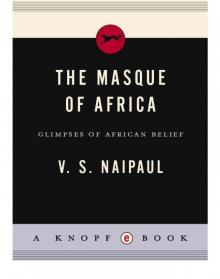 The Masque of Africa: Glimpses of African Belief
The Masque of Africa: Glimpses of African Belief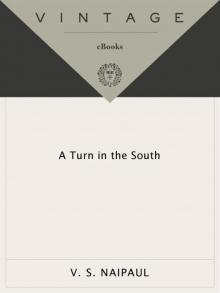 A Turn in the South
A Turn in the South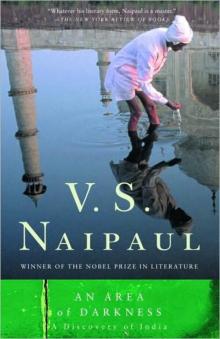 An Area of Darkness
An Area of Darkness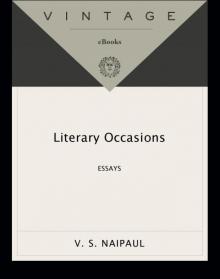 Literary Occasions: Essays
Literary Occasions: Essays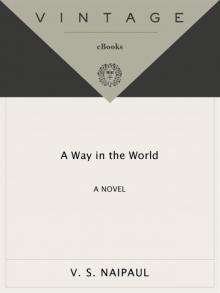 A Way in the World
A Way in the World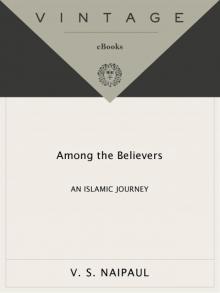 Among the Believers: An Islamic Journey
Among the Believers: An Islamic Journey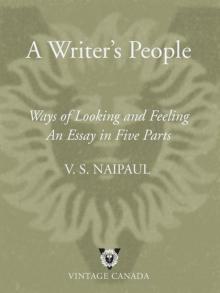 A Writer's People: Ways of Looking and Feeling
A Writer's People: Ways of Looking and Feeling The Mimic Men: A Novel
The Mimic Men: A Novel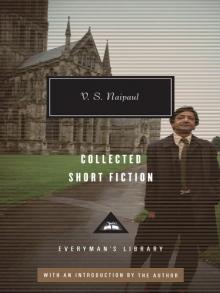 Collected Short Fiction
Collected Short Fiction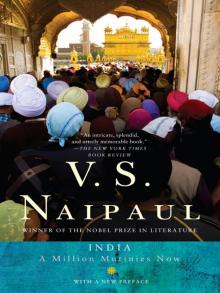 India: A Million Mutinies Now
India: A Million Mutinies Now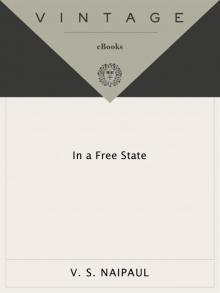 In a Free State
In a Free State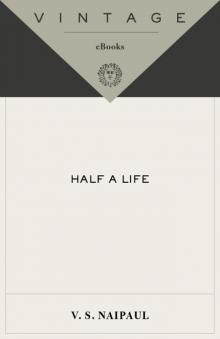 Half a Life
Half a Life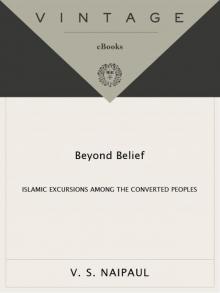 Beyond Belief: Islamic Excursions Among the Converted Peoples
Beyond Belief: Islamic Excursions Among the Converted Peoples Guerrillas
Guerrillas A House for Mr. Biswas
A House for Mr. Biswas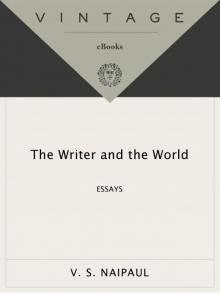 The Writer and the World: Essays
The Writer and the World: Essays Magic Seeds
Magic Seeds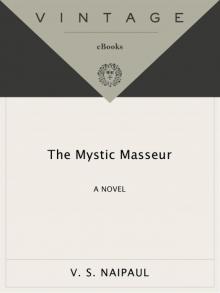 The Mystic Masseur
The Mystic Masseur Miguel Street
Miguel Street The Return of Eva Perón, With the Killings in Trinidad
The Return of Eva Perón, With the Killings in Trinidad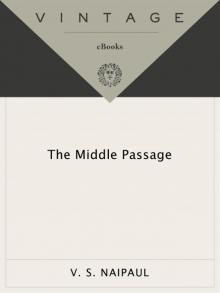 The Middle Passage
The Middle Passage A Bend in the River
A Bend in the River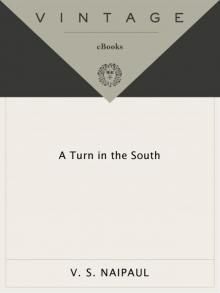 A Turn in the South (Vintage International)
A Turn in the South (Vintage International)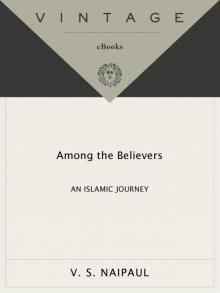 Among the Believers
Among the Believers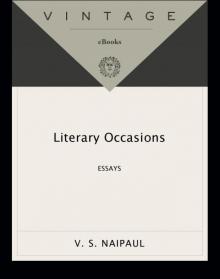 Literary Occasions
Literary Occasions The Mimic Men
The Mimic Men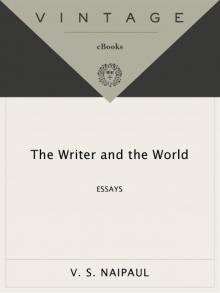 The Writer and the World
The Writer and the World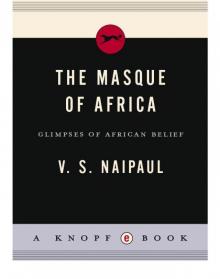 The Masque of Africa
The Masque of Africa